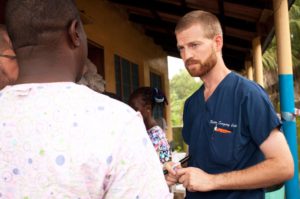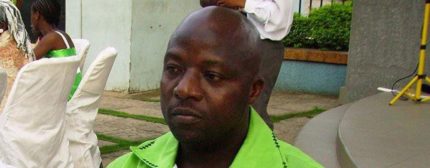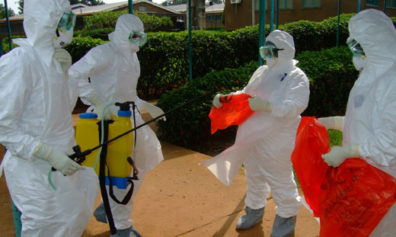One of the things that made Ebola so terrifying was that it appeared there was no cure for the devastating disease. But a secret serum developed by a San Diego-based company may be an Ebola miracle cure, as it apparently saved the lives of the two Americans who contracted the disease in Liberia.
Amid the stunning media reports about the possible Ebola miracle drug, some observers are wondering why the drug was tried only when two white Americans contracted the disease, considering that Ebola has been wreaking havoc in West Africa for months. Ebola has been diagnosed in 1,600 people and killed more than 700 in Liberia, Sierra Leone and Guinea. It has thus far killed about 60 percent of those infected.
The World Health Organization told CNN it was not involved in the decision to give the drug to the Americans, who had to provide consent because the drug, called ZMapp, had only worked on primates and had never been tried on humans. Patrick Sawyer, a naturalized American originally from Liberia, died at a Nigerian hospital without receiving a dose of ZMapp.
The saga of how the drug made it to Liberia and was administered to the Americans—Dr. Kent Brantly and missionary Nancy Writebol—reads like something out of a Hollywood movie.
San Diego-based Mapp Biopharmaceutical has been working on an Ebola serum for several years with the National Institutes of Health and the Defense Threat Reduction Agency, an arm of the military responsible for countering weapons of mass destruction.
The ZMapp drug—which was stored at subzero temperatures—reached Liberia on Thursday morning, but upon the implicit instructions of the lab it couldn’t be administered until it had thawed naturally. That meant Brantly and Writebol had to wait eight to 10 hours before it could be administered to them, a source told CNN.
Brantly, who had the disease for nine days, requested that Writebol get the first dose because he is younger and he thought he had a better chance of fighting it. But as they waited, his condition became worse. Brantly told doctors he thought he was dying, so he asked if he could have Writebol’s dose, which had now thawed. So they began administering it to him through an IV.
“Within an hour of receiving the medication, Brantly’s condition dramatically improved,” according to CNN. “He began breathing easier; the rash over his trunk faded away. One of his doctors described the events as ‘miraculous.'”
Brantly’s condition improved so much that he was able to shower on his own before boarding the specially equipped Gulfstream Air ambulance jet. After he arrived at the U.S., Brantly—sheathed in a Hazmat suit—walked on his own into Emory Hospital.
Writebol didn’t show significant improvement until she received a second dose of the drug on Sunday. She was flown to the U.S. and is now also being treated at Emory.
Before there is widespread elation that a cure is at hand, health officials tried to inject some sober reality.
World Health Organization spokesman Gregory Hartl told CNN that health authorities “cannot start using untested drugs in the middle of an outbreak, for various reasons.”
Doctors Without Borders issued a statement saying: “It is important to keep in mind that a large-scale provision of treatments and vaccines that are in very early stages of development has a series of scientific and ethical implications. As doctors, trying an untested drug on patients is a very difficult choice since our first priority is to do no harm, and we would not be sure that the experimental treatment would do more harm than good.”
There is normally a long, complicated process before a drug can be given to patients under FDA regulations. But the FDA does have a “compassionate use” regulation that allows experimental drugs to be administered in emergencies such as this one, according to CNN.
Apparently the ZMapp results were promising enough to move the Defense Threat Reduction Agency to send additional funding to Mapp Biopharmaceutical, a relative newcomer to the industry, founded in 20o3.
For those interested in the science behind ZMapp, this is how CNN described the workings of the drug:
“Antibodies are proteins used by the immune system to mark and destroy foreign or harmful cells. A monoclonal antibody is similar, except it’s engineered in a lab so it will attach to specific parts of a dangerous cell, mimicking your immune system’s natural response. Monoclonal antibodies are used to treat many different types of conditions. This medicine is a three-mouse monoclonal antibody, meaning that mice were exposed to fragments of the Ebola virus and then the antibodies generated within the mice’s blood were harvested to create the medicine.”
Dr. Anthony Fauci, director of the National Institute of Allergy and Infectious Diseases, told CNN that Mapp has very few doses ready for patient use.
“Apparently the company is trying to scale up, (but) it’s not easy to scale up to very large number of doses,” he said.


